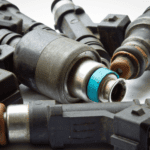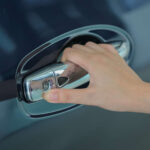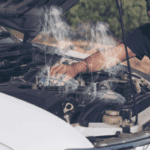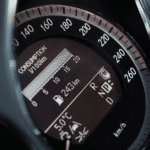Infuriating, I know, you’ve just changed the battery, and now the new one won’t stay charged. This happens often, especially when the old battery is completely flat, and no proper checks were carried out to determine what caused the battery to fail. The good news is this article has you covered, and the six most common causes of a new battery not staying charged are below.
6 Reasons Why a New Car Battery Won’t Hold a Charge
1. Alternator
The fact the car battery was flat, and this may be you, but people sometimes assume the fault is the battery without conducting a proper test of the alternator at the same time. They replaced the battery, but the new car battery fails within a few days because the fault was the alternator not keeping the battery fully charged.
The role of the alternator is to take over, providing the electricity to components that need it once the engine is running. In addition, it also provides charge to the battery, which will have depleted some of its charge, getting the car started.
If your new car battery struggles to hold a charge, get it running and conduct an alternator test. The alternator should be kicking out between 13.4 and 14.4 volts. You can perform a basic test with just a voltmeter but require a specific charging systems tester to check the voltage ripple properly. Be sure to visually inspect the serpentine belt and tensioner, which can lead you to believe you have a bad alternator. If the alternator is out of these parameters, alongside any other noticeable symptoms it will need replacing.
As the battery is pretty new, providing it has not been damaged by running with it under charging, you may be able to replace the alternator and have no further issues with the battery. But be aware you may need to replace the battery again.
2. Faulty battery
A faulty battery can happen for a couple of reasons, although manufacturers do their best to limit this happening through QC processes. You still get the odd one or two that slip through. However, one such problem is sulfation which occurs when a battery is left in a partially discharged state while it sits on the shelf waiting to be fitted. Sulfation leads to the formation of sulfate crystals on the battery plates, which reduces the battery’s ability to hold and deliver the initial voltage to start a car.
Another is just the internal wiring and connections in the battery are faulty or damaged, which might have happened during manufacture or in transit. Either way, the battery will need replacing, but it should be under warranty.
3. Old battery supplied as new
Although the newly replaced battery may look new, if it’s not holding a charge, you could question how long it has sat on the shelf and was it stored correctly?
New car batteries must be stored in ambient temperatures, away from direct sunlight. They also have approximately two years of shelf life and should be tested regularly. A combination of age and poor storage could drastically reduce the shelf life of a new battery and encourage a fault to develop. It will only be discovered when you buy the battery and fit it, and the car fails to start after several uses. Car batteries are supplied with warranties when new for these very purposes.
4. Parasitic drain
A parasitic drain on a car battery means an electrical load continues to draw power from the battery even when the vehicle is turned off. The keys are no longer in the ignition. A parasitic drain can appear from any component in a car that has electricity flowing to it or through it, but most commonly are found from:
- Interior or exterior lights left on
- Faulty electrical components, i.e., a power window switch.
- Audio system
- Alarm system
- Faulty ECU or engine sensor
- Charging system problems
- Wiring issues
- Accessories and aftermarket modifications – GPS systems, phone chargers, or dashcams
- Ignition switch problems
Finding which component that is causing a parasitic draw can be challenging and time-consuming. Generally, even most experienced mechanics will use an automotive electrician to address this type of fault as it usually will work out quicker and cheaper to trace the fault.
5. Poor connections
A poor connection doesn’t just refer to the positive and negative terminals correctly secured to the battery. A poor connection can come from frayed or damaged battery cables, corroded battery terminals, incorrect terminal size for the battery posts, and even loose battery posts on the battery (faulty battery). An intermittent or poor connection will result in a new battery that may appear faulty; the car may start intermittently and even seem to drain very quickly.
Checking these issues is time-consuming and requires a voltmeter to check voltages between cables and connections. The issue is you can’t always see the problem. For example, a broken or frayed battery wire may not be visible as the wires are usually covered in a PVC coating.
6. Incorrect battery
One thing that is always worth double-checking when having trouble with a new car battery is, do you have the correct battery for the car. For example, having a tiny battery for a Honda Civic fitted to a big-engined F-150 truck is no good. It may work and start the car once or twice, but it will fail quickly.
I specifically remember a Honda Civic that wouldn’t start with the hood closed a long time ago. It came into the garage I was working in on a flatbed; we pushed it into the workshop, and to our surprise, the incorrect battery had been fitted. The battery was now catching and shorting out on the underside of the hood when it was closed when trying to start it. It turned out the battery was far too tall for the car and nothing like the original.
When checking the battery is correct, you’ll need the original or the original specs if possible. Ensure the car has the right battery type and the dimensions are correct. You should compare the specs usually on a sticker on the battery, making sure Cold crank amps (CCA), Reserve capacity (RC), and Ampere-Hour(Ah) ratings are all the same.
What to Do if a New Battery Won’t Hold a Charge
One thing to be sure of is to ensure no other problems are causing the battery to fail. If you have the correct tools perform a charging voltage check on the alternator before changing the battery again or immediately after fitting the new one.
I’ve yet to come across a brand of car batteries that don’t offer a warranty for a minimum of 12 months. If you struggle with your new car battery not holding a charge, you should be able to exchange it free of charge. However, be warned if they didn’t fit it for you in the first place, expect to change the battery yourself. However, if they did fit it for you, they should replace it again for you. Also, one last point to be aware of is if the car does have a fault that caused the new battery to fail, you might struggle to have it replaced under warranty.
Can You Drive With a New Car Battery That Won’t Hold Charge?
First, you need to be sure of the problem; if it’s a faulty battery, you should be ok to drive. But if the fault is a bad alternator, you may not be able to keep the car running. However, if you can get the car started, you should be able to drive it a quick short distance, provided you don’t stall it. Although you may struggle to start the car again, so I would refrain from popping to the shops and only drive the vehicle to a place of repair.
On starting the car, you’ll rarely struggle using a jump pack, jumper cables or a push start. If you struggle, the battery may be too far gone, and you may need to push the car out of harm’s way. This can be tricky in an automatic transmission vehicle, but there is usually a neutral safety switch by the shifter.
Final Thoughts
A new car battery that fails to stay fully charged is most commonly caused by an alternator failing to keep the battery charged or a faulty battery was supplied. There are other causes to be aware of, such as faulty connections and parasitic draws, but these are rare. If you encounter a problem with a new battery, you must double check what is causing the problem rather than just replacing the battery under warranty; this next new one may only take a few goes at starting the car before it also dies!










What is the quickest way to test for a parasitic draw,what tool o r equipment is needed.Also what is the cheapest way to check?
Thanks for your question. This is not necessarily an easy process and sometimes best left to a mechanic with experience. First, you will require a voltmeter, I suggest start by checking the battery and alternator are working correctly. Next check across each fuse with the voltmeter and look for a significant voltage drop. This indicates a drain, you can then carry out further investigation on that circuit.
Hope that helps.
Regards
Tommy
carsneedcare.com